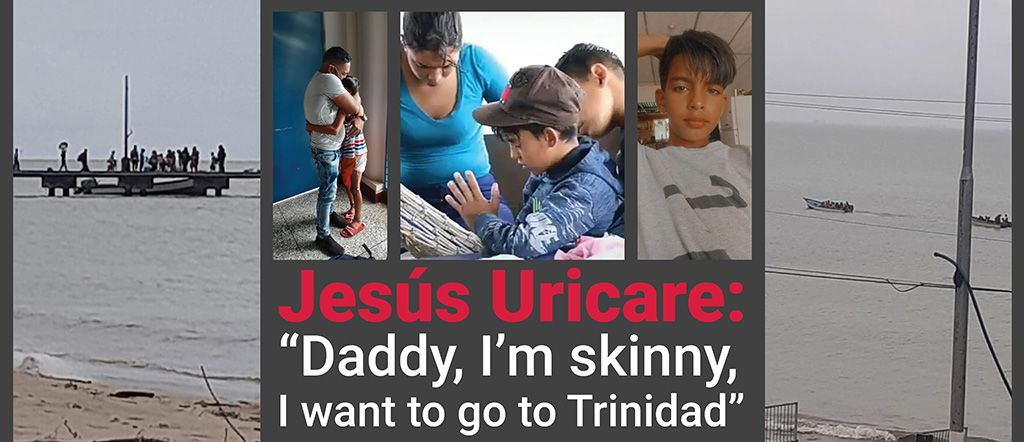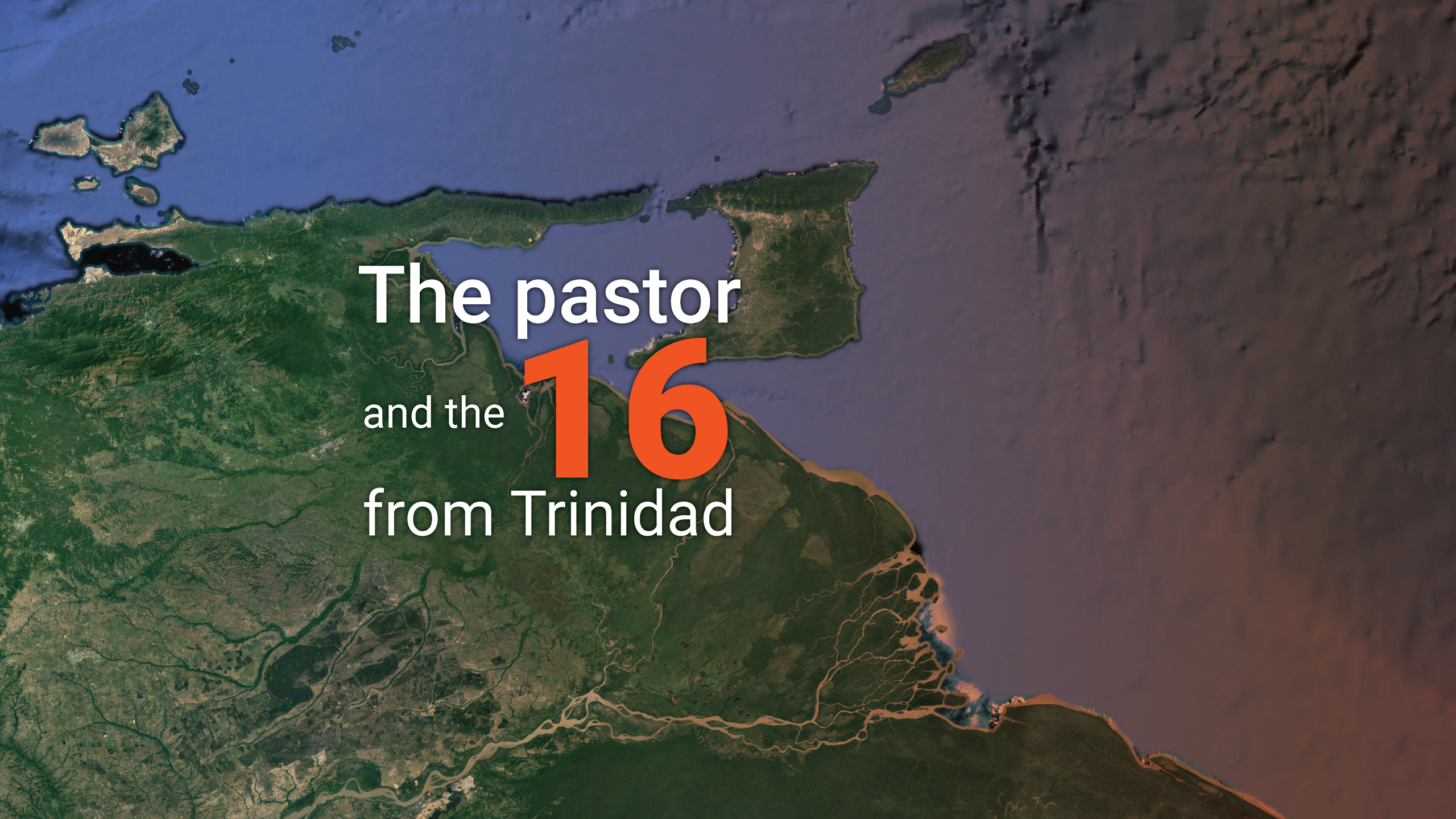
By Valentina Oropeza
Escorted by two policemen, the pastor stopped in front of the cell. Women and children got up from the ground and tried to touch him through the iron bars. They spoke at the same time, louder and louder, as if each were trying to impose their voice on the other. The pastor inhaled to prevent his from breaking. “Be patient, we are working to get you out of here.” They showed him the four-month-old baby. Eliezer Torres didn’t understand why they were being treated like criminals.
That well-lit, light-walled dungeon housed 25 people: 16 children and 9 Venezuelan women. They entered Trinidad and Tobago irregularly, departing by boat from the Venezuelan eastern coast. On Tuesday, November 17, 2020, they were detained by the Trinidadian authorities during the closure of borders due to the coronavirus pandemic. On Saturday 21, when the pastor visited them, the children and women had already been in detention for four days.
Six children traveled without a parent, six were abused at home, two suffered from heart conditions and had no access to proper medical treatment in Venezuela. Several of the women lived separated from their husbands because they had fled to Trinidad to work and send remittances. They all shared the same struggle for surviving in Delta Amacuro, the poorest state in Venezuela, where income poverty reaches 98% of the population, according to calculations by the independent consultancy Anova.
One of the parents told the pastor that he had gone to the Venezuelan consulate in Port of Spain. An official called him irresponsible, how did he happen to send his children alone in a boat. Eliezer decided to support the parents when he learned that none of them spoke English. He was tired of seeing Venezuelans choke before police or immigration officials because they did not know the language.
His first task was to help Nafeesa Mohammed, the Trinidadian lawyer who accepted the case, to make a list of the names, surnames and ages of the 16. He also collected information on the immigration status of each relative in Trinidad, to present the case before a judge who would make the decision to accede to or reject the group’s stay on the island. In carrying out this task the pastor was able to get an idea of who was who when he arrived at the dungeon.
The group that traveled unaccompanied was made up of a 4-year-old girl, two 11-year-old girls, a 12-year-old boy, a 13-year-old boy, and a 17-year-old boy. Eight were with their mothers: three brothers aged 2, 7 and 11; three siblings aged 3, 6 and 12; and two brothers aged 5 and 9. Also a 17-year-old girl with her 4-month-old daughter, the youngest of the 16.
That Saturday, the pastor traveled for four hours from Port of Spain, in the northern part of the island, to the Cedros police station in the southwest. The officer in charge gave him five minutes to pray with the children. They told him that they all used the same bathroom and it was clogged. Parents brought food during the week, but the children received ham and bread for breakfast, lunch, and dinner. A dad left a KFC fried chicken at the station, and it never made it to the cell. As they prayed, the pastor had the impression that the authorities were granting him a few minutes of grace.
The lawyer received a call to inform her that the children were going to be deported, despite the fact that she had sent letters to the Chief of Immigration and the Chief of Defense Staff requesting that they would be allowed to leave. She pleaded with the authorities that if the children have tested negative for COVID-19, they can quarantine at home instead of doing it at the heliport in Chaguaramas, a military base where deportees are held.
The lawyer pleaded Trinidad and Tobago’s obligations, as a signatory state to the Convention on the Rights of the Child, to ensure that the 16 were not separated from their parents and to respond to the request to enter the island to guarantee family reunification. The detention of a child will be used as a “last resort”, she said, respecting their right to maintain contact with family members.
While Eliezer was praying with the group, Nafeesa and a junior associate attorney at law drafted a writ of habeas corpus requesting the High Court of Trinidad and Tobago to make an order to present the children in court and call the public officials to give reasons for the imprisonment. The detention was not justified because they were fleeing a humanitarian emergency in Venezuela. By 6:00 pm on Saturday the 21st November, the application for the writ of habeas corpus was filed to the court. The attorneys got confirmation that the hearing was appointed the next day, on Sunday 22nd at 2:00 pm.
Muslim and descendant from an Indian family, Nafeesa Mohammed has been a legal consultant in the Office of the Attorney General for eight years. Before that, she was a senator for five. For several years, she worked closely with critical stakeholders in the administration of justice, including the Ministry of National Security, to establish the national family court and reform the laws on children as well as the implementation of the Children Authority, the state body that protects children.
Nafeesa Mohammed is a Trinidadian lawyer who specializes in children’s law.
Nafeesa Mohammed is a Trinidadian lawyer who specializes in children’s law.
The pastor asked the officer one last question before leaving the police station.
—Please, be honest. Is there already a deportation order for them?
—No —the policeman replied.
The next day, Sunday, November 22, one of the detained women called her husband early from the Cedros police station. She told him that they were going to transfer the group. They were asked to sign a piece of paper in English, no one understood what it said. None of the State officials translated the content. The pastor proposed that they photographed the document for translation, but the image never came. They agreed not to sign until they found out what was happening.
The Trinidadian meteorological service activated a yellow alert at 7:00 in the morning. A tropical storm was passing through. Despite the weather, several parents went to the Cedros dock, the closest official entrance to Trinidad from the police station, to verify that the children were not expelled. They hid in some bushes on the beach. Policemen came and went. A man was drawing water from a boat with no name or number. Around 9:30 in the morning they saw the group board the boat and set sail in the middle of the storm.
The translator pastor
Eliezer Torres learned his first words in English from a Trinidadian pastor who lived in Puerto Ordaz, an industrial city in southern Venezuela; he called him “uncle”. The pastor was like a brother to his father. When Eliezer was 26 years old, in 1998, he traveled to Trinidad for the first time and took courses to pass the Pitman Qualification, a language certification issued in Great Britain.
Dark skinned and fluent, he felt just like another Trinidadian. Then he returned to Venezuela and worked as an English teacher, until his salary was no longer enough to support two children and their parents. He returned to Trinidad in 2017 to establish the Evangelical Church Ministerio Internacional Avivamiento, as entrusted to him by his pastor Richard Rodríguez from Puerto Ordaz.
At a school in Itnac, an NGO that assists Venezuelan refugees in Port of Spain, Eliezer taught children who were reunited with their parents after entering Trinidad irregularly. However, he did not dare to expose his own children to the risk of being detained while they crossed the sea.
Pastor Eliezer Torres founded an evangelical church in Port of Spain
Pastor Eliezer Torres founded an evangelical church in Port of Spain
Six hours after the children were deported, at 3:00 pm on Sunday, the hearing of the habeas corpus application began by videoconference. It was the first time that Eliezer Torres had the opportunity to be a translator in a court procedure.
Neither the judge, lawyer, pastor or parents, knew the whereabouts of the children.
The 16 at sea
Judge Avason Quinlan-Williams asked the police, Immigration and Coast Guard, about the children’s whereabouts. They all denied having information. She then summoned the Trinidadian Minister of National Security, Stuart Young. Although his office governs the involved authorities Young said he knew nothing, and recalled that irregular entry to the island is a crime according to Trinidadian immigration laws. Being a former colleague in practice, Nafeesa could not believe the minister would appear before the court without reading the documents of the case.
Nobody knew the captain of the unregistered boat, where he was or where he was going with the children. The pastor did not understand why the authorities placed the children in an irregular boat, especially after the representatives of the Trinidadian government alleged that it was a case of human trafficking.
During the eight-hour hearing, interrupted by 30-minute breaks, the parents tried to find out the children’s location and wondered whether they had reached La Barra, a mangrove area where the Orinoco River discharges its tributary into the Caribbean Sea and where indigenous communities dwell. There were no gasoline recharging stations and no telephone signal in those dark water canals. Tucupita, Delta Amacuro’s state capital and the closest city, is about six hours away by boat. If they ran into a Venezuelan National Guard patrol, they would take them to Tucupita. The children would lose the opportunity to emigrate.
By midnight on Sunday, the judge issued the writ of habeas corpus and asked the Chief of Defense Staff, the highest military rank in Trinidad, to present the children in court next day, on Monday 23rd November, at 1:30 pm.
Out of jurisdiction
The pastor recorded a video as a spokesman for the parents on Monday, surrounded by ten children relatives. He asked the Trinidadian government to clarify under what conditions the group returned to Venezuela and why they were transferred in a boat without identification. More than 24 hours had passed since they were expelled from Trinidad.
At the second hearing, late in the afternoon, authorities confirmed that the children were outside of Trinidadian waters. The judge acknowledged that she had no jurisdiction over the case and could not protect them. The parents did not know their children’s whereabouts. They were helpless.
The Inter-American Commission on Human Rights (IACHR) called on the government of Trinidad and Tobago to respect the principle of non-refoulement, the cornerstone of the Geneva Convention relating to the Status of Refugees: anyone who has left their country to seek protection in another cannot be returned until the asylum application has been answered.
The hashtag #DondeEstanLos16 (Where are the 16?) became a Twitter trend on Tuesday, November 24, two days after the children were expelled from the island. Relatives contacted people in La Barra who said that the boat arrived after the engine broke down. Another boat towed them. The children’s vessel had no roof and travelled without life jackets. They hid from the National Guard in the mangroves. Despite mosquitoes, cold and humidity, the kids slept two nights protected by the indigenous people.
Undesirable
On Tuesday afternoon, November 24, when the children had been out of Trinidad for more than 48 hours, Minister Stuart Young called a press conference. He said that anyone who entered the island irregularly would be considered as “undesirable.” He pointed out that the United Nations High Commissioner for Refugees (UNHCR) card, that recognizes the refugee status of Venezuelans, did not give immigration status.
A journalist asked him if any of the children had been deported without their parents. He replied that he had no evidence of it. “I asked it in court. Tell me who these individuals are, and could not be told. My understanding of what happened there is that they were re-escorted across the borders (...) I didn’t put anyone on a boat to leave where they came from.”
The reporter asked if he could specify the children’s whereabouts. The journalist interviewed the mother of an 11-year-old girl who was on the boat and did not know where she was. “I can’t. (...) Where is the responsibility of that mother? Is that a situation that you should put your child into? (...) How did these children end up here without their parents? That is a typical red flag of human trafficking.”
When Young warned that the residence permit of any Venezuelan could be revoked if he or she helped “to breach the law,” the pastor wondered if translating the hearings could bring him consequences.
Within an hour of the minister declaring the stance of the Trinidad and Tobago government, the Venezuelan opposition leader David Smolansky published a video showing children and women in a boat. The group entered through a beach called Los Iros, in southwestern Trinidad. In response to a reporter, Young said that he was unaware that the group had returned.
After performing PCR tests in an outpatient clinic, the children and women were taken to Erin’s police station. One of them posted a video from a cell where she said there were 24 people. The children were vomiting, coughing, had fever, diarrhea and stomach pain. Several women had neck and back pain, probably because of their body position on the boat. In the background she filmed a latrine. Everyone used it and there was no separation from the crowd, no walls for privacy. Once the video spread through social media, they were banned from using cell phones.
The parents travelled back to Port of Spain and met Gerald Ramdeen, the new attorney on the case.
Trinidadian lawyer Gerald Ramdeen took up the case of the 16 after the group entered Trinidad a second time.
Trinidadian lawyer Gerald Ramdeen took up the case of the 16 after the group entered Trinidad a second time.
In a new hearing, the judge authorized the parents to bring food and clothing to the children at the Chaguaramas heliport. They could have cell phones. The state attorney protested the decision, if the parents were to visit them, they would have to meet in cubicles through a glass, and speak on the local telephone. The pastor recalled the prisons from Hollywood movies. The judge responded that the children were in quarantine, not in prison.
She warned that the mass deportations of Venezuelans could not continue, and each case had to go through the court. She recalled that the UNHCR card recognized the status of refugees and insisted that Trinidad should honor its commitments under international laws. At the end of the hearing, the pastor felt optimistic.
The registration
The government of Trinidadian Prime Minister, Keith Rowley, enabled a mandatory registration for Venezuelans, regardless whether they had entered the country irregularly, for 15 days in May 2019. 16,523 people were registered.
Rowley posted a thread on Twitter the following day, Wednesday, November 25th:
“Trinidad & Tobago is currently under the latest assault, using nameless, faceless people armed with innocent children to try and force us to accept their understanding of ‘refugee status and international treaty’ (...) Under the rubric of ‘humanitarian’ this interpretation, if accepted, will effectively prise open our borders to every economic migrant, gun runner, drug dealer, human trafficker and South American gang leader/members. All they will be required to do is make the 7-mile boat trip and claim to be ‘refugees’”.
From Geneva, that same day, the UN Human Rights Office spokeswoman, Liz Throssell, made a comment on the deportation of the 16:
“Children should never be forcibly deported based on their, or their parents', migration status. The precondition to any return involving a child is that an independent and impartial decision has been taken, involving child protection officials, and that a return is a sustainable solution that will ensure the rights, welfare and best interests of the child.”
The 11-year-old girl
The pastor had been absent from work for several days. A colleague used to cover him, but he had the day off. If the pastor didn’t show up, he could lose his job. The parents were waiting for him to translate the judge’s interviews with each relative of the children to explain how they lived in Venezuela, why they fled to Trinidad and what they did on the island.
Eliezer estimated that each testimony would take about two hours, there were more than twenty relatives. He knew Venezuelans who worked as interpreters, but the parents couldn’t pay them. One of them told him that the evangelical organization Living Waters offered resources to cover the attorneys’ fees. He asked to include his own, although they did not know the amount of the contribution.
The pastor got other colleagues to cover him in order to do the interviews as soon as possible. The judge was going on vacation on Monday, November 30. He avoided speaking during the hearings so that the murmur in Spanish would not distract the lawyer. When the session ended, the pastor translated Ramdeen’s summary. Exhausted by a week of sleepless nights after the hearings, he felt powerless to take on the testimonies translation.
As of Monday, November 30, the judges and attorneys of the State were different persons in every hearing. The cases were separated. The pastor felt that he was losing his patience when a state attorney began explaining Trinidad and Tobago’s geography.
An 11-year-old girl, the daughter of a Venezuelan woman who had the Acnur card, did not appear in the 2019 registry. The State’s lawyer alleged that she was staying irregularly in Trinidad, and therefore did not have the right to stay in the island. The judge invited her to see her daughter in Chaguaramas. The pastor, lawyer, and other parents, interpreted the offer as an alibi to capture and deport them together. They advised her not to go near the heliport.
To prevent the little girl from being deported, Ramdeen filed an appeal with the Court of Appeal on November 30, challenging the government’s decision to expel her.
At the hearing on Tuesday, December 1, Judge Frank Seepersad refused to grant an injunction to the girl and dismissed the constitutional motion, despite the fact that the appeal had not reached the court, and paved the way for her to be expelled. The parents lost hope that a judge would decide in favor of the children.
Authorities showed photos of the heliport. Inmates had access to washers and dryers, slept in air-conditioned facilities, and children had play areas. The pastor did not want to tell the parents that he distrusted the images.
One of the parents traveled to Chaguaramas, 18 kilometers from Port of Spain, to take 40 apples to his children. They had never eaten apples before. He did not have enough money to buy them in Venezuela, and it was the first gift he wanted to give them when in Trinidad. But they didn’t let him pass, so he left the fruits. He returned home not knowing if the children had received the gift.
The pastor and several representatives arrived in Chaguaramas around 9:00 p.m. on Saturday, December 5. They left 14 bags with shampoo, soap, toothpaste, drinking water, pills to control vomiting and diarrhea, cookies, juice and soft drinks. The guards refused the prepared food because everything had to be sealed.
After giving interviews to reporters, a father confessed to the pastor that he felt humiliated when they asked him why he had allowed his children to come on that boat. The answer was obvious to him, he couldn’t feed them in Venezuela. When the pastor consulted the articles that were published about the case on Facebook, he read the reader’s opinions. Many said that there were no more resources in Trinidad to help Venezuelans. It was time for them to leave the island.
As days passed, the lawyer obtained injunctions to prevent the government from deporting the 16.
The end of the quarantine
The two-week quarantine was completed on Tuesday, December 8. Everyone woke up with the expectation that the children would be released, but there was no information. When the pastor got home, he saw on the news that three Venezuelans were killed. They had been set on fire with gasoline. When he saw his photos, he couldn’t believe it. He knew them. “Three less,” commented a user on social networks. The pastor wondered if he really wanted to take his own children to Trinidad and Tobago. For the first time he thought of leaving the island.
The following day, Wednesday December 9, the IACHR granted protection measures for six of the children for being exposed to domestic violence in Venezuela. Deportation would imply “a serious risk” for them. Asked in Parliament about the announcement, Trinidad and Tobago’s attorney general, Faris Al-Rawi, responded that the island was not part of the IACHR.
The authorities extended the quarantine until Monday, December 21 because one person in the group reportedly tested positive for Covid-19.
The intimidation
Four men, who said they were policemen but wore civilian clothes, looked for the pastor at his work. A fellow guard asked for their names. They did not identify themselves, so the guard refused to give them information.
A neighbor showed Eliezer a video from a security camera. A gray Toyota Aqua had roamed the street where he lived. Two friends warned him that there were rumors, he had to be careful. He decided to tell the lawyer what was happening. “They are going to find a way to intimidate you, but they can’t do anything to you. Keep me posted,” Ramdeen replied.
Four days after the men searched for him at work, on Monday December 14, he looked out the window and saw a man struggling to open the door of his house. At the entrance was the gray Toyota Aqua. The pastor went to his room and drew the curtain. He was alone. When the man tried to look in through a window, Eliezer took a step back and took refuge in the shadows.
As soon as he checked that the car was gone, he went to Independence Square, where Venezuelans gather in Port of Spain. He was summoned by relatives of drowned refugees, who appeared floating off the coast of Sucre state, near Güiria, on Saturday 12 and Sunday 13 December. They wanted guidance to investigate whether the Trinidadian government had any responsibility in their family members’ sinking.
The asylum
Rowley’s government extended registered Venezuelans residence permit until June 2021. UNHCR and Living Waters will no longer be able to register asylum seekers, the prime minister said at a press conference. “If you are going to apply for asylum in Trinidad and Tobago, or anywhere in the world, you have to prove that you are personally in danger, personally under attack because of your race, religion, politics or whatever (...) Your ambition for a better life through economic changes does not apply for asylum anywhere in the world.”
Rowley referred to the refugee profile described in the Convention on the Status of Refugees, signed in Geneva in 1951. That definition was expanded in the Americas 33 years later with the Cartagena Declaration, in response to the migratory crisis caused by the civilian wars of Central America. Since 1984, a person fleeing their country is also considered a refugee because “their life, security or freedom have been threatened by generalized violence, foreign aggression, internal conflicts, massive violation of human rights or other circumstances that have seriously disturbed public order.” However, Trinidad and Tobago is one of the five countries on the continent that has not incorporated the Cartagena principles into its internal legislation.
On the day that Rowley declared to the press, Thursday, December 17, 2020, the monthly minimum wage was equivalent to 1.25 dollars in Venezuela.
In 2018, 94% of the population did not have enough income to pay for a food basket or basic services. At least 18 million people had no access to diagnosis and medical treatments. 8 out of 10 did not have continuous running water. One third of children between 0 and 2 years old in the most vulnerable sectors were stunted. 64% of Venezuelans lost an average weight of 11 kilograms due to lack of food intake, between 2016 and 2017. All figures are estimates from Venezuelan NGOs, because there is no official data. In September 2020, an international mission of the UN Human Rights Council published a report documenting crimes against humanity.
Venezuela is experiencing the most severe economic contraction in the modern history of the Western Hemisphere. It lost four-fifths of its economy in the last seven years. Hyperinflation, which has accumulated for more than three years, destroyed the value of the bolivar and people’s ability to buy food or medicine. The economic and public services collapse, coupled with crime and the political crisis, fueled the migration of 5.4 million people in five years, estimates UNHCR. More than the entire population of Costa Rica or Norway.
The decision
Two days before Christmas, on Tuesday December 22, the pastor saw the lawyer smile for the first time. Two judges from the Court of Appeal overturned judge Frank Seepersad’s decision and granted the girl a provisional measure, which allowed her to stay on the island. It remained unclear when Immigration would execute the court’s ruling.
The children spent Christmas night at the Chaguaramas heliport.
A gray car was hanging around the pastor’s house on Sunday, December 27. Saddened by the anxiety this was causing on his family, Eliezer decided to move someplace else for a while. The next day, Monday, December 28, the children’s parents recorded a video demanding their release, 34 days after the quarantine began.
“How am I going to traffic my own children?”
Nafeesa met with the parents on Wednesday, December 30, to request the children to be released by the Immigration office. They were asked for copies of the birth certificates authenticated by the Venezuelan authorities, to corroborate the identities of the children and the link with their representatives.
The parents arrived at the Venezuelan consulate in Port of Spain at 11:00 in the morning. An official reproached they had been waiting for them for three weeks. He asked why they had waited until December 30 to go to the consulate. The pastor tried to explain that they did not know about the paperwork, but the man would not let him speak. If he had no children in the group, he better not intervene.
One of the parents rebuked the official, saying that he was at the consulate when the children were captured and had been mistreated. The consulate employee accused him of being part of a human trafficking ring because he paid a boatman to take the children. “How am I going to traffic my own children, ah?”, the father replied. Although the official said that the process took four business days, they validated the birth certificates in two hours.
Half of the outcome
The next day, Thursday, December 31, 2020, Immigration officials began interviewing the parents at 8:00 a.m. Over and over, they asked if they paid to send the children to Trinidad and to whom.
One of the mothers said that she was often beaten by the father of her daughter. While she was in Trinidad without the girl, he extorted money from her. That’s why she sent him money to ride her daughter on a boat. One of the parents was threatened with six months in jail and a seven thousand dollar fine if they proved he was lying. The pastor was interviewed as a representative for the 17-year-old girl and her daughter because they had no relatives in Trinidad.
After defending several Venezuelan cases, Nafeesa observes that many asylum seekers are entering and leaving Trinidad by boat, even as the borders are closed. They are unaware that returning to the country from which they fled undermines their asylum application.
After spending more than eight hours at Immigration, the parents were told that the children would be released at 5:00 in the afternoon. Eliezer, the lawyer, and the parents ran to Chaguaramas. Behind came the same people who interviewed them in Immigration. One by one, they called the parents again.
The 17-year-old boy came out first. Then the 11-year-old girl who received the precautionary measure. Then a 12-year-old boy, the 12, 6 and 3-year-old brothers, and an 11-year-old girl. Finally, the 5 and 9-year-old brothers. After 7:00 pm, the pastor took photos and videos of the 9 released children. They were crying surrounded by their parents and the lawyer. All the mothers who travelled in the boat were detained.
When Nafeesa saw the immigration officials leaving, she ran up to them and asked what would happen to the others. “Later,” replied one. The children who were not claimed by direct relatives remained in Chaguaramas. She went back to the group of parents and asked if they had anything to eat for New Year’s dinner. More than a dozen of them ended up at Nafeesa’s home. The pastor came back to his house, thinking of his family that is still in Venezuela.
One parent stayed with another and his children. He went out for a moment and, when he came back, the children were crying. They thought he had abandoned them. During the five weeks they were in Chaguaramas, they ate fish almost every day. They found a worm once. One of the children said that if he couldn’t know what his mother was eating at the heliport, he’d rather not eat.
When Eliezer arrived in Trinidad in 2017, he applied for a missionary visa but it was denied. He thinks it is unfeasible to request family reunification through UNHCR. After an aunt passed away last year in an insurmountable race for medical treatment, Eliezer’s father asked him not to bother returning to Puerto Ordaz.
After more than two months of confinement, seven minors are still being held: a 4-year-old girl, a 13-year-old teenager, three brothers of 2, 7 and 11 years old, and the 17-year-old girl with her daughter, who turned five months in Chaguaramas. Also the nine women. One of the parents told the pastor that if his wife was deported, he would have to send his children back to Venezuela because he must work. He cannot take care of them alone.
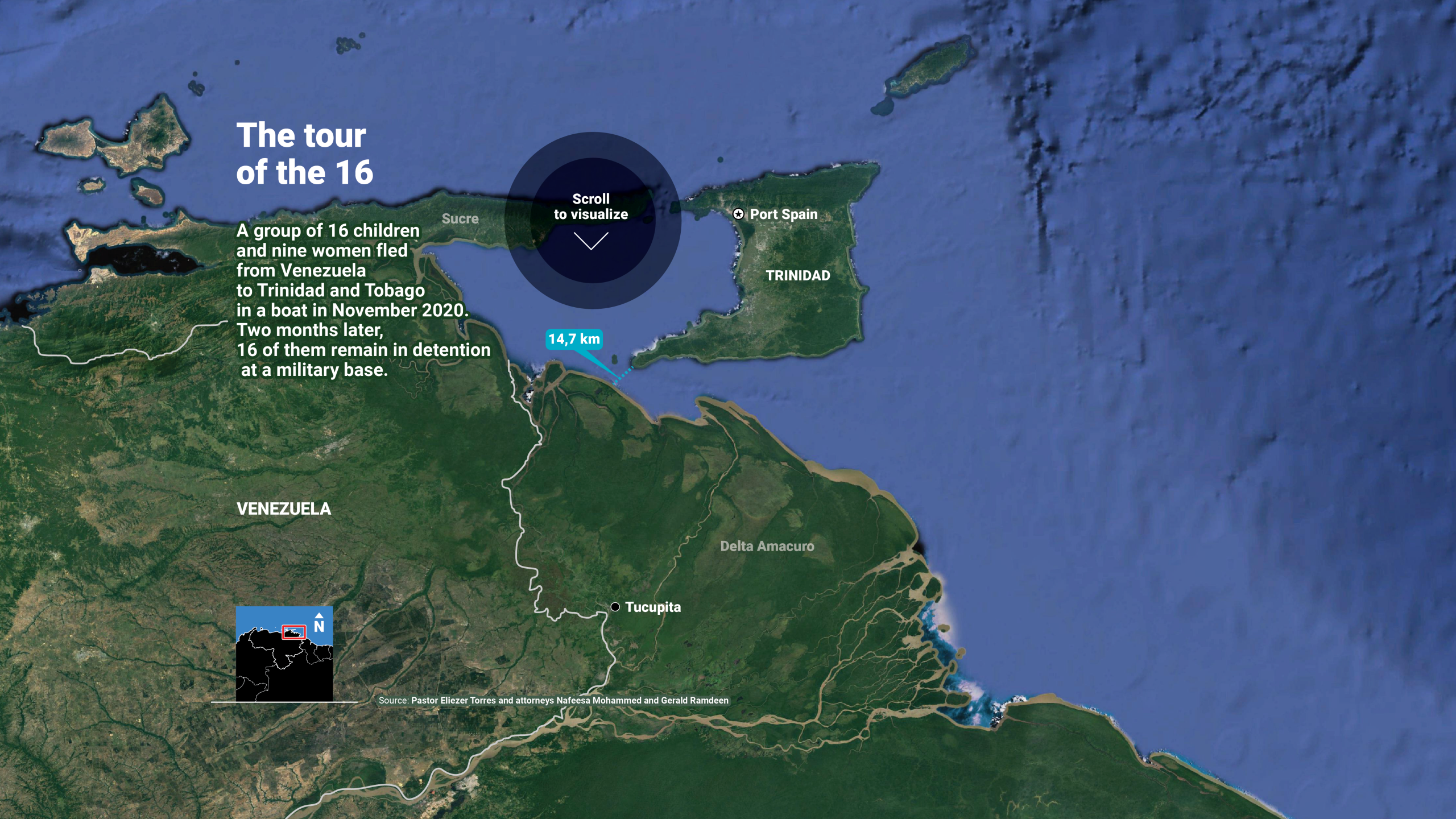
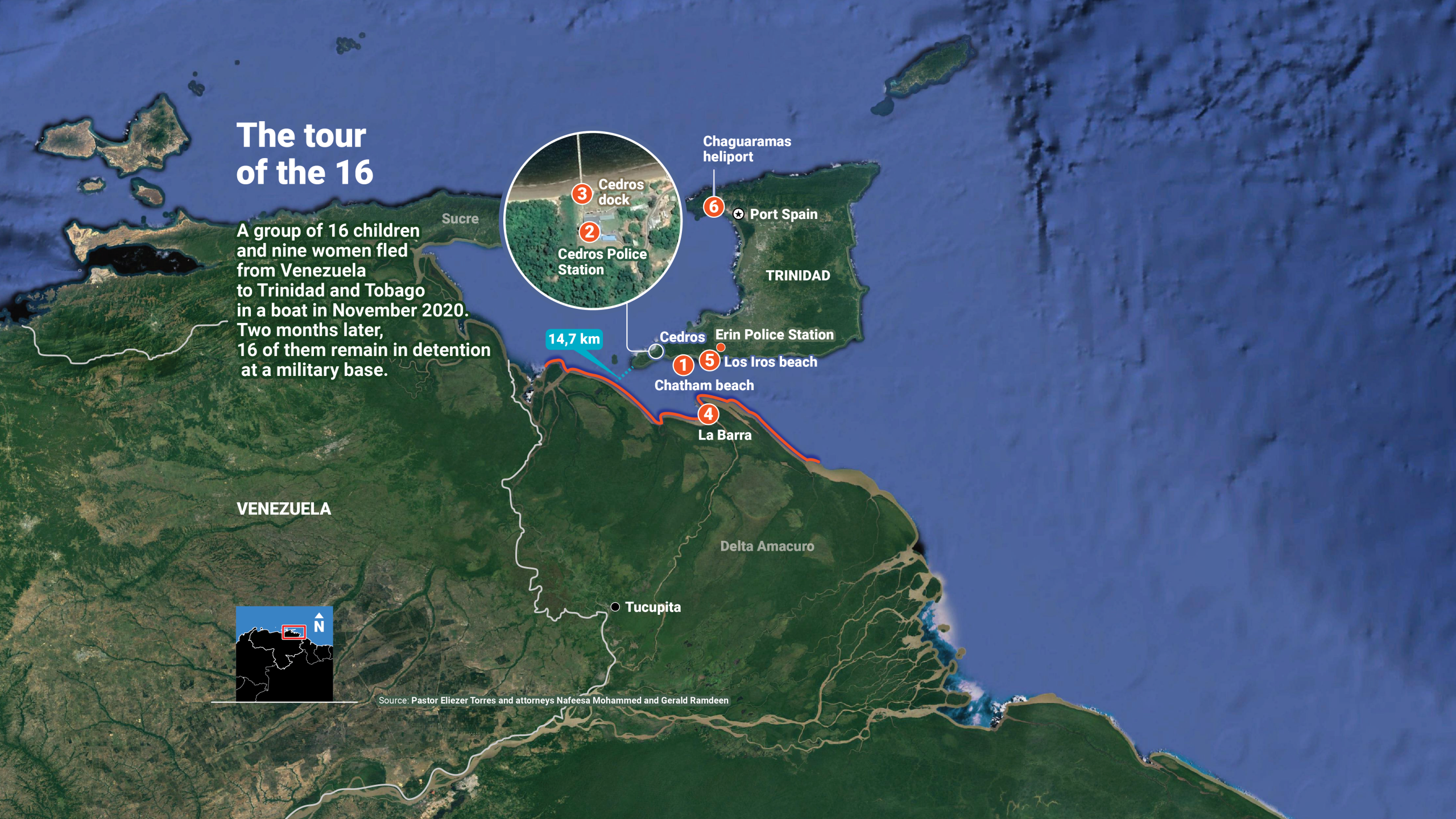
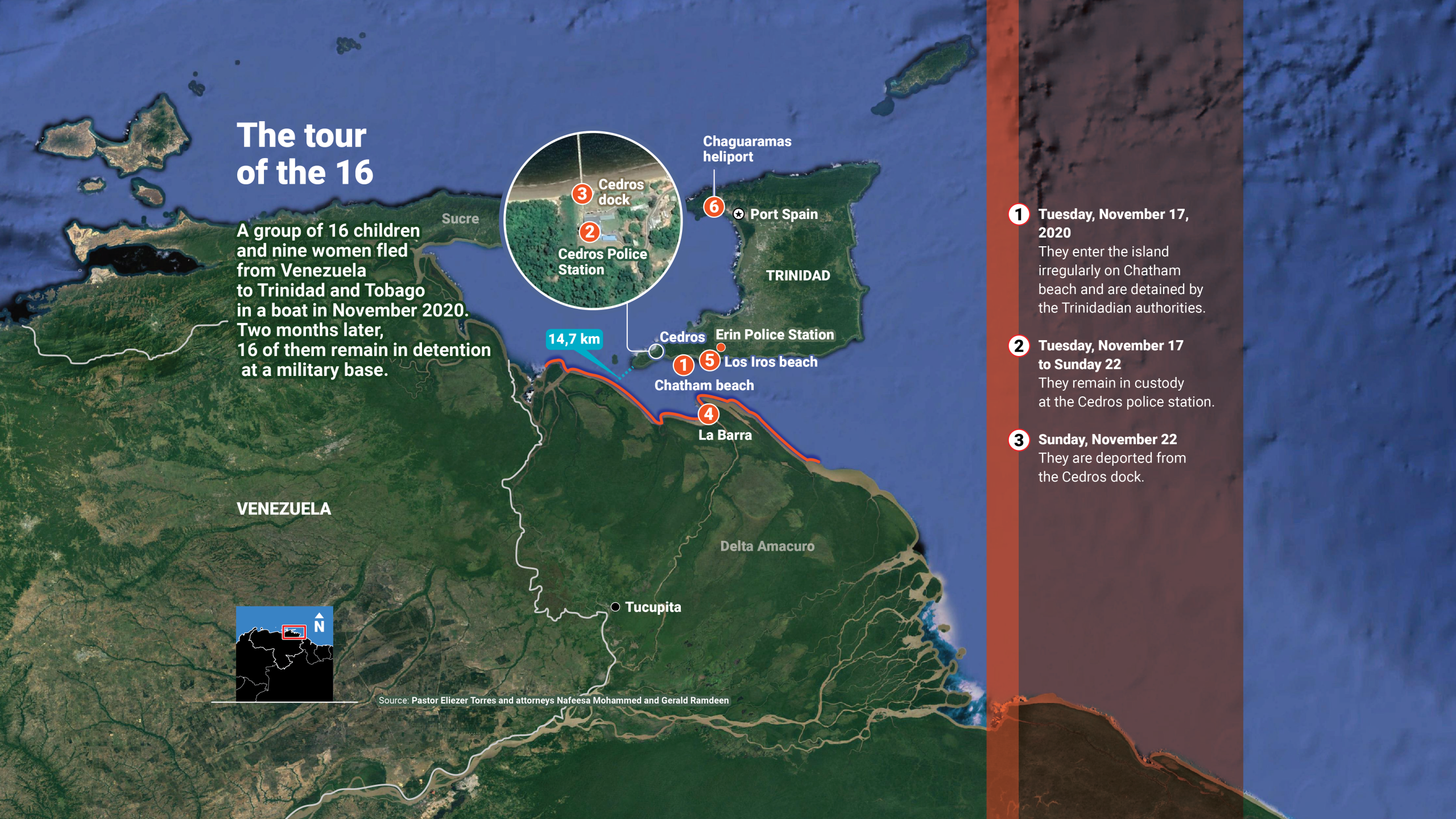
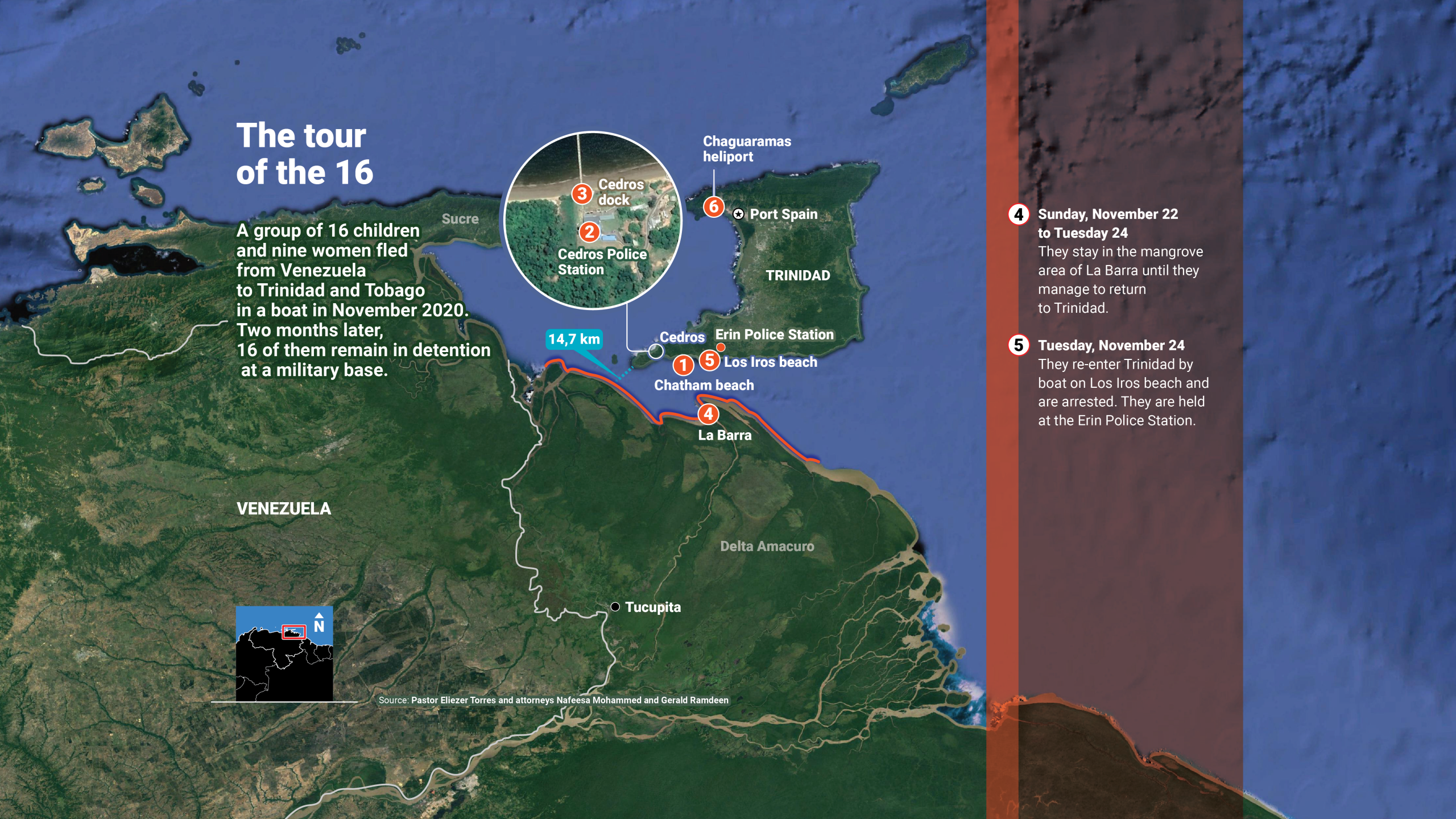
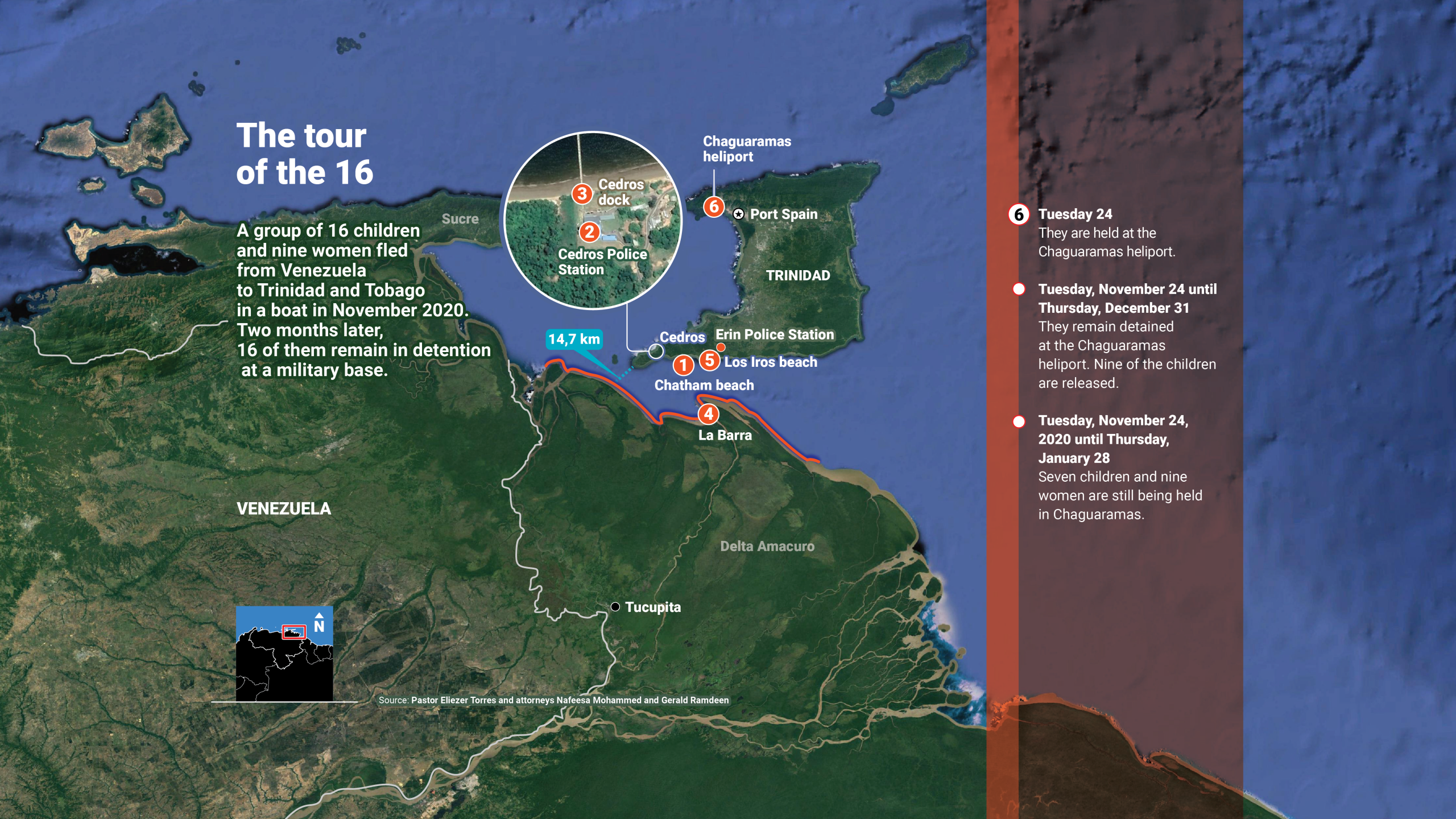
Credits
Graphic Design: John Fuentes
Editors: Ángel Alayón y Oscar Marcano
Infographic: Franklin Durán
Photography: Courtesy of Nafeesa Mohammed, Eliezer Torres and Gerald Ramdeen.
Translation: Valentina Oropeza and Helena Carpio.
Caracas, February 3, 2021




